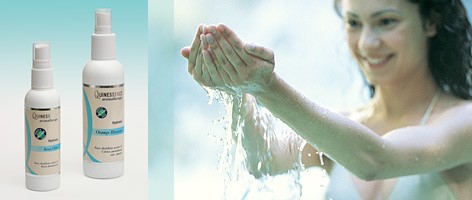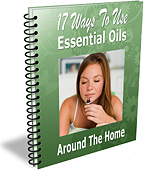
Flower Water
Flower water and floral water are descriptive, but now seriously outdated terms used to describe the condensate water that remains after the extraction of an essential oil by water or steam distillation. When essential oils are produced by either of these methods not all of the aromatic and healing principles held within the plant are actually captured in the essential oil.
Certain components are hydrophilic, which means they dissolve into water, and this produces what is variously known as a flower water, hydrosol or hydrolate. Whatever you choose to call it, the resulting fragrant water contains the very essence of everything that was contained within the plant when it was still alive and growing.
See the full range of pure and natural Flower Waters from Quinessence.
What's in a name?
The terms flower or floral waters are misleading since these miracle waters can be produced from herbs, needles, leaves, woods, barks and seeds. In aromatherapy, these products are now more commonly referred to as hydrosols, and this is the term that we prefer to use for our range.
To complicate things further, many 'flower waters' today are made from synthetic compounds which smell quite pretty but posses absolutely no healing properties! In fact, quite the opposite - they can cause serious skin irritation.
Others are produced by adding essential oils or absolutes to water by using alcohol or some other type of dispersant or solvent. This may appear to be perfectly acceptable, since the finished product contains essential oil and has a pleasant fragrance similar to a natural flower water.
However, this type of reconstituted product lacks the wealth of vital healing properties present in a true flower water, - remember, many of the plant constituents were dissolved into the water whilst extracting the oil, so they were never present in the essential oil in the first place!
Therefore adding an essential oil to water will never create a product with the same range of healing benefits as a true floral water. There is simply no substitute for the real thing, so don't let anybody try and fool you.
Aroma-therapeutic uses
Flower waters are highly versatile and can be used for personal care and around the house. In skincare, Rose, Orange Blossom (Neroli) and Lavender flower waters are great for hydrating dry skin and cooling hot and sensitised skin. If you have been out in the sun too long and got burned, Lavender flower water is soothing and comforting as well as healing. Used in the final rinse after shampooing, flower waters help to condition hair and add a shine.
We know of no better remedy for puffy, dark circles under the eyes than Chamomile floral water. Just soak two cotton wool pads with it and cover each eye for around 10 minutes for an immediate and dramatic reduction in puffiness. Regular use can help diminish those dreaded dark circles too.
Perfect for summer
During the summer flower waters are perfect to use as a cooling body mist, and the most cooling of all is Peppermint. Make sure you take some with you to use on holidays, on the beach and even to cool those aching tootsies when you are out shopping! Flower waters help to revitalise you when your energies are beginning to flag, and a few sprays onto a tissue makes a handy wet-wipe for all sorts of applications including babies and grubby children.
To calm a restless baby try adding a few tablespoons of Lavender or Chamomile flower water into their bathwater. This can be especially beneficial if your baby is suffering from nappy rash or eczema, because the soothing properties of these flower waters help calm the irritation and speed up the healing process.
Flower waters are safe to use on young children, and since they only contain a small amount of essential oil they do not need diluting much further except as above when using with very young babies.
A green alternative
Floral waters such as Rose or Neroli can be added to the final rinse water in your washing cycle as well as used as a fragrant linen spray whilst ironing since they smell much nicer than their synthetic counterparts. Around the house, flower waters are great to freshen the air instead of using aerosols which of course are harmful to the environment.
Right now the future for these miracle healing waters looks much brighter than for a very long time, partly due to the growing interest in aromatherapy. There have also been vital contributions from authors such as Jeanne Rose, Nelly Grosjean and more recently Suzanne Catty. These, and other pioneering spirits have helped to rekindle the interest in this most versatile and gentle of aspect of aromatherapy.
If you enjoyed this article, please click the 'Like' button and help spread the word:
Next Natural Skincare
See also Quinessence Hydrosols Range
>


